Ancient Rome 2nd century BC
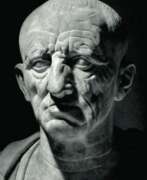

Marcus Porcius Cato the Elder, also known as Cato the Censor (Censorius), was an ancient Roman soldier, politician, historian, and writer.
Originally from a plebeian family, Cato, driven by ambition, achieved high office and held various public positions. He was also a famous orator, engaged in the improvement of Rome. Cato was an active campaigner against vice and luxury, for which he earned the nickname Censor. He was also an innovator of Roman literature, a historian, the first significant Latin prose writer, and the first author of a history of Italy in Latin.
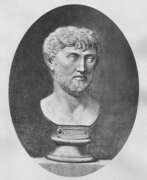

Titus Lucretius Carus was a Roman Epicurean poet and philosopher.
Lucretius is considered one of the most prominent adherents of atomistic materialism, a follower of the teachings of Epicurus. He is the author of a six-book Latin didactic poem on Epicurean physics, De rerum natura ("The Nature of Things" or "On the Nature of the Universe").
This poem is an extended exposition of the Epicurean worldview, a naturalistic explanation of the physical origin, structure, and destiny of the universe. It includes theories of the atomic structure of matter and the origin and evolution of life forms - ideas that eventually became the most important foundation and framework for the development of Western science. In addition to his literary and scientific influence, Lucretius served as an inspiration to a number of modern philosophers, including Gassendi, Bergson, Spencer, Whitehead, and Teilhard de Chardin.
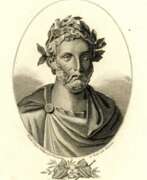

Titus Maccius Plautus, more commonly simply Plautus, was an ancient Roman playwright and comedian.
Little is known about his life, but it is believed that as a young man he worked as a stage master, stage designer, and possibly an actor. In time, Plautus went into the merchant business and, as far as is known, worked in a mill after the collapse of his enterprise. In his spare time he studied Greek dramaturgy, and by the age of forty had finally achieved success as a playwright whose comedies were the most popular dramatic works of their time.
Plautus's plays were largely borrowed from Greek works belonging to the New Comedy style. They were essentially social comedies of manners, which usually told of the domestic life of the middle and upper classes. But they also featured and played a significant role in them obliging slaves, and often young lovers, a strict father, a pimp, military men, etc. Plautus talentedly adapted Greek works for the Roman audience. Instead of exquisite Greek, Plautus deliberately used simple Latin, even street language, which was understandable to the lower classes that made up the bulk of his audience. The playwright had an excellent mastery of the art of theater and knew exactly what to include and what to change in the play to entertain the audience and at the same time not to hurt the tastes and ambitions of the upper classes.
Titus Maccius Plautus is one of the greatest playwrights of ancient Rome and was even granted Roman citizenship as a reward. Of his 130 plays have reached our time only twenty. Many great playwrights of the following centuries, including Shakespeare, based their comedies on Plautus' plots.
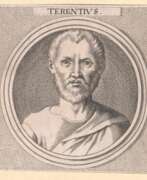

Publius Terentius Afer, better known in English as Terence, was a Roman African playwright during the Roman Republic. His comedies were performed for the first time around 166–160 BC. Terentius Lucanus, a Roman senator, brought Terence to Rome as a slave, educated him and later on, impressed by his abilities, freed him. It is thought that Terence abruptly died, around the age of 25, likely in Greece or on his way back to Rome, due to shipwreck or disease. He was supposedly on his way to explore and find inspiration for his comedies. His plays were heavily used to learn to speak and write in Latin during the Middle Ages and Renaissance Period, and in some instances were imitated by William Shakespeare.
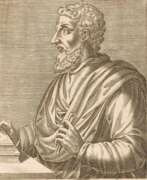

Marcus Terentius Varrō, sometimes called Varro of Reatinus, was an ancient Roman scholar-encyclopedist and writer.
Varro was a very prolific writer: the titles of his 74 works are known, totaling 620 books. Varron was engaged in logic, language, poetry, history, law and geography, history, art, history of literature, theory of music. Judging by the surviving accounts of his contemporaries, the most significant of Varron's lost works were "Divine and Human Antiquities" (Antiquitates rerum humanarum et divinarum) in 41 books and "Portraits" (Imagines) in 15 books, which contained biographies of famous Greeks and Romans, as well as 700 portraits that illustrated the text. The treatise "On Agriculture" (De re rustica) in three books has survived in complete preservation.